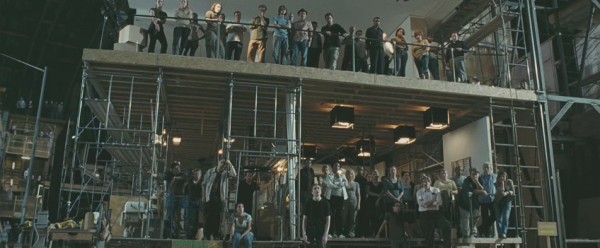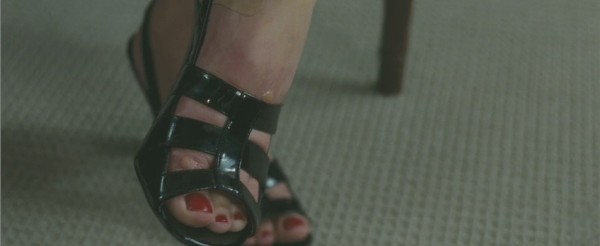[Note: This essay contains minor spoilers.]
This week I've been embroiled in a lively discussion at The Film Doctor regarding Charlie Kaufman's Synecdoche, New York, a film that has risen to a personal pinnacle among last year's cinematic offerings since I first experienced it in November. Perhaps unsurprisingly, mulling over Synecdoche's intricacies with other commentators—who are generally cooler to the film's bitter pleasures than I—has been helpful in evolving and solidifying my own views. There's enough to chew on in Synecdoche to occupy one well into the gumming years, but for now I just want to offer a few post-scripts to my initial review of the film.
***
While Synecdoche, New York addresses depression with a bracing forthrightness, it's increasingly apparent to me with each viewing that it is not, in any sense, a depressing film experience. There seems to be a temptation to label any film that takes up timeless, "negative" themes such as mortality, failure, and loss as intrinsically dismal, but such shorthand does a disservice to the efforts of those artists who deign to work with such moribund clay. Shouldn't it matter what a film has to say about mortality, failure, and loss, and how it says it? This is where Synecdoche gets its goofy, ghastly fingers into me. Rather than a mere two-hour repetition of the fact that Things End, it emerges as a harsh indictment of those trapped within ridiculous loops woven from this self-evident sentiment. My personal struggles with such snares render Kaufman's accusatory finger—crooked and mischievous through it may be—as an especially stinging critic. However, Synecdoche offers a balm: It's not just about you. Through the peculiar telepathy of cinema, I know with some certainty that Kaufman struggles with such despair as well. It doesn't end there: Synecdoche presents a message of universal suffering—"This is everyone's experience. Every single one."—and therefore the possibility of universal love.
To elaborate: One of Synecdoche's primary effects is to jolt the viewer into a recognition of the overwhelming magnitude of the human dilemma of transience, to remind us that it is a human dilemma, not your dilemma. Caden only understands this imperfectly. He calls attention to his cast's mortality to satisfy his own ego and sorrow-addled sadism. (Especially that cutting amendment, "[E]ach of us secretly believing we won't [die].") He's not commiserating with his performers out of compassion, or even acknowledging their humanity. Given the potency of our own traumas and disappointments, as felt from within the oubliette of our skulls, it's easy to forget (or ignore) that every other person feels their own traumas and disappointments just as keenly. The isolation we feel within our suffering is illusory. And so a remarkably Buddhist sentiment surfaces within Kaufman's film: By clinging to our misery as if it were unique, we only deepen our misery. By instead reaching out to embrace the misery of others, to make it our own, and pursue its diminishment as fervently as we pursue the diminishment of our own, we might create a connection, an artery through which a spiritual palliative can flow, sweetening our brief time in the world.
***
Over at FilmDoctor, I noted that Kaufman, like David Lynch, has a spooky flair for shaping his cinematic worlds according to dream-logic, a talent I describe as an "intuition for intuition". I never sense that Kaufman's surreal visuals or jumbled narratives represent a contemptuous weirdness for weirdness' sake. Not that the reason for every odd jot up on the screen is immediately apparent, but where films like Synecdoche and Mulholland Drive succeed is in striking a consistent aura of aptness, whatever bizarre tongue they choose to speak. Caden's complaint about Madeleine Gravis' self-help book ("I'm not really getting it") and Madeleine's response ("Oh, but it's getting you") could be an exchange between myself and Kaufman. Given the intense, intuitive character of both Synecdoche's stimuli and my own responses, it's impossible for me to adequately articulate why exactly the film works as art.
Is this just a cop-out? Is it a hand-waving means to avoid a fair-minded, clear-eyed examination of the film's flaws? Fair enough. Yet it seems significant that a dense exegesis of the film is possible not merely due to the presence of its staggering detail, but the arrangement of that detail and the manner in which the characters interact with it. It's easy to dismiss a work as vast and perplexing as Synecdoche as a disjointed hodge-podge simply because it doesn't effortlessly coalesce into a neat package at a certain angle, like some Magic Eye picture. Yet dreams don't conform to this expectation, so why should a film do so when it so plainly strives for an oneiric sensibility? Internet forums such as those at IMDb and Rotten Tomatoes are littered with viewers who ostensibly enjoyed Synecdoche, but are oddly obsessed with discerning some secret talisman that will unlock its mysteries, an answer that will snap all of its peculiarities into focus. Lynch himself gave voice to this compulsive need to quest for a skeleton key, when in an early episode of Twin Peaks, Agent Dale Cooper coins the slogan: "Crack the code, solve the crime." Of course, Lynch and his partners (and adversaries) on that seminal show went on to metaphorically bash Coop's teeth in for presuming that a solution could be had by a sufficiently meticulous reading. Art is not a cryptogram, and vice-versa.
This is why the frustrated questions that seem to stem from Synecdoche's surreal particulars—Why the burning house?—lack easy answers, or at least easy answers that are not simultaneously misleading on some level. There is no grand solution buried deep in Synecdoche's mordant heart, but rather a plethora of truths, some observational, some instructive, that are underlined and bolded every time one scratches at a given detail, often uncovering hidden, gilded layers.
***
One final note: Manohla Dargis' intensely personal review and Roger Ebert's stream-of-consciousness "anti-review" have received a lot of attention, but if you haven't read Nick Davis' vast, superlative treatment of Synecdoche yet, do so now.






